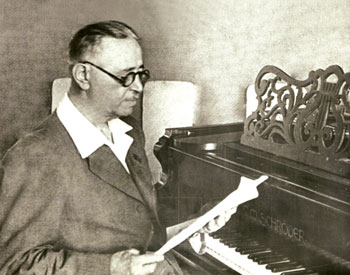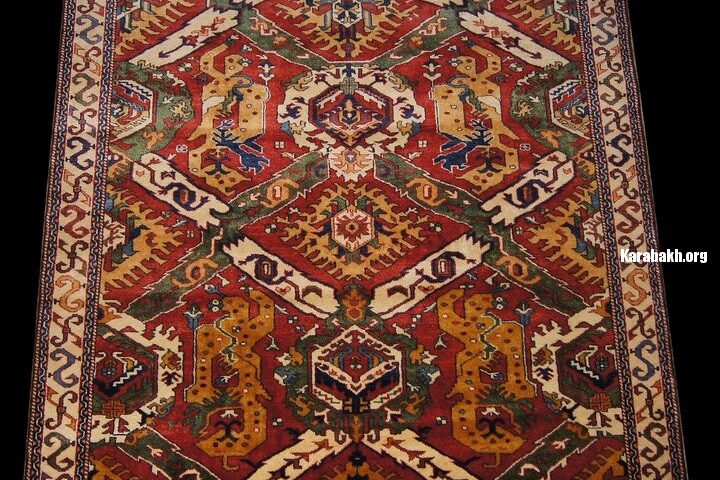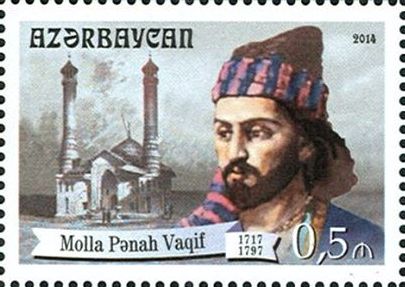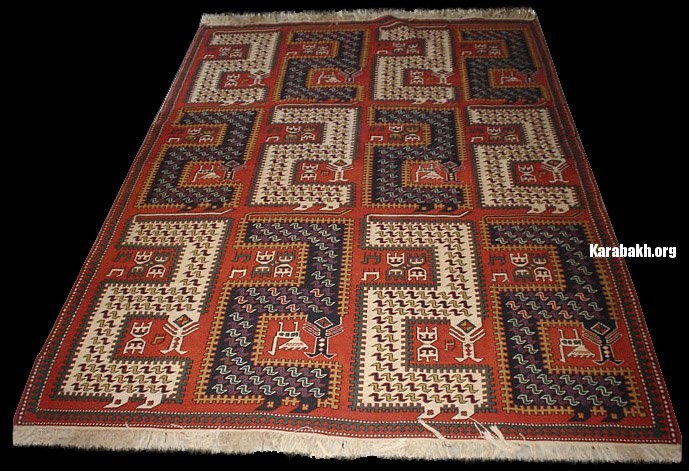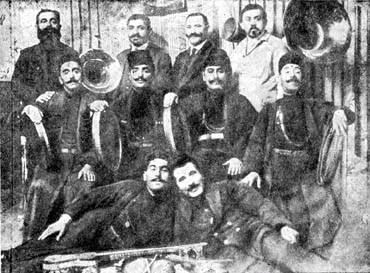Farhad bey of Karabakh
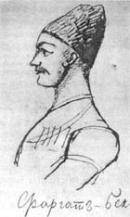
Karabakh gave Azerbaijan many prominent commanders. During Russo-Ottoman ws in 1828-1829 first Azeri regiments were organized within the Russian Army. This was initiated by count Paskevich, the Russian commander-in-chief of the time. There were organized four Azeri regiments under command of the general Rayevsky. Paskevich wrote in his report to Czar Nicolas: «I can’t close my eyes to the courage of the Muslim [here meaning Azeri] regiments. They fought heroically in all the battles and distinguished themselves in all the attacks».
It has to be noted, that the first one among the above mentioned four Azeri regiments in the Russian Army, were comprised of Karabakhis. The commander of the first Karabakh cavalry regiment was Russian officer Mesheryakov and his deputy was Farhad bey of Karabakh. When travelling to the Caucasus during the Russo-Ottoman war of 1878, the great Russian poet A.S. Pushkin and Farhad bey met each other and became friends. Pushkin personally witnessed the heroism of the Karabakh cavalry regiment. The personal courage of his friend Farhad bey didn’t pass unnoticed as well. Pushkin even dedicated a poem to Farhad bey:
Don't be captivated with your fame, You young handsome man! Don't rush to the bloody battle With your Karabakh fighters!I know, death won't approach to you, Amongst the swards Azrayil will notice your beauty, And his mercy will be on you!But I'm afraid, amongst the battles You lose forever Modesty of your behavior And charm of your shyness!*
Azrayil – the angel of death in the Islam religion.
* A.S.Pushkin [to Farhad bey] «Camp near Euphrates»
The English translation is that of the creators of the site and doesn’t pretend to be perfect, however is exact.
Faraj bey Agayev (1811-1891)
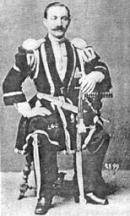
Born Shusha in 1811 the general-lieutenant Faraj bey Agayev Farhad bey Agayev is one of the prominent commander of Azerbaijan. When 26 years old he joined voluntarily the Russian Army and several in the Caucasus moslem regiment. In 1838 he got the officer rank. Soon afterwards having noted Agayev’s military talent, count Paskevich transferred him to the Emperor’s Guards. On the seventh year of his military service Faraj bey became rotmister ( the Cavalry captain ) of the Guard and three years later he was promoted to the colonel rank and was appointed the regiment commander.
In 1844, when inspecting the Guard troops, the Emperor Nicolas I attended Faraj bey’s regiment, met him personally and was very satisfied with his work. Soon, the Russian Czar even formally adopted Faraj bey as his son. From that day all the official documents referred to Faraj bey as Nicolas Nicolayevich Agayev.
In 1850 Faraj bey Agayev was sent to Tiflis. He worked 30 years in the most responsible positions in the military headquarters in Tiflis. During 1850 – 1880 Agayev participated in the Caucasus wars, especially distinguished himself in the Russo-Lezghin war. In 1853 Agayev commanded first the Ossetin cavalry, the Shusha cavalry detachment. The same year he was promoted to the general rank for his heroism in the battle of Kerukdere. Later in 1878 Agayev was further promoted to the general-lieutenant rank and was awarded with a sward of the Russian Emperor for his military deserts.
Faraj bey Agayev served in the army with honor for 45 years. Having retired in 1882 72 year old general spent his last years in Tiflis and was closely engaged in philanthropy.
Samed bey Mehmandarov (1856-1931)
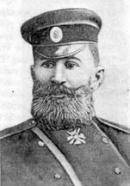
One of the most prominent Azeri commanders general Samed bey was born in Shusha in the noble Mehmandarov’s family. He dreamed of being a military serviceman since childhood, therefore he entered the Petersburg military artillery school and graduated from it in 1875 as an ensign. In 1904, when Russo – Japan war began, Mehmandarov distinguished himself particularly during the defense of Port – Arthur ( China ) For his outstanding deserts during the 11 – months long heroically defense of Port – Arthur, Mehmandarov was rewarded the «Saint George» order, a special golden sward and was promoted to the general major rank. After Russo – Japan war Mehmandarov commanded the 3rd Siberian Army Corps and was promoted to the general – lieutenant rank in 1908.
With the beginning of the WW I the Mehmandarov commanded 21st division fought in the Austro – German front. His division particularly distinguished itself in the battle near Lodz in Poland. By the end of the WW I Mehmandarov was already the commander – in -chief of the Group of Corps and was awarded with Russian, British, French and Romanian ordens.
With the establishment of the Azerbaijan Democratic Republic (1918) Samed bey Mehmandarov became the first minister of defense of Azerbaijan. He had outstanding deserts in establishment of the national army during those hard years.
After the fall of the national government and the Soviet invasion Mehmandarov wished to stay in the Motherland and didn’t leave the country despite great risk to his life. Narimanov the Azeri communist leader of the time, stood up for the old general taking into consideration Mehmandarov’s military knowledge and experience. Mehmandarov spent his last years teaching in the Azerbaijan military school. Together with his friend Aliaga Shikhlinsky, who also preferred to stay in the Motherland, Mehmandarov did a lot for preparation of many military specialists in Azerbaijan.
Aslan Vezirov (1910-1988)
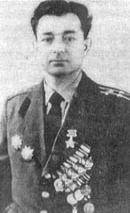
Karabakh is also the birthplace of many prominent commanders, who fought against fascism during the World War II. One of them is Aslan Vezirov born in 1910 in the village of Zumurkhach in Karabakh. In 1928-1930 he studied in the military engeneering schools in Leningrad (present-day St-Petersburg) and Moscow. Vezirov was serving in Ukraine, when Germany attacked the Soviet Union. Thus, he had to face the difficulties of war since the beginning. Throughout the war he fought in the Caucasus Front, 2nd, 3rd and 4th Ukraininan Fronts, 1st Baltic and 2nd Belorussian Fronts. Having covered a battlefield from Min. Vody in the Caucasus to the Elba river in Germany, Aslan Vgezirov served with honor till the end of the war. When serving in the 2nd Belorussian Front, the commander-in-chief of the Front Marshall Rokosovsky appointed him the commander of the 1st military engeneering brigade. For his exemplary fulfillment of the battle tasks colonel Aslan Vezirov was awarded the highest title – the Hero of the Soviet Union.
Vezirov retired from the Army in 1947. From 1965 till his death in 1988, he was the chairman of the Republican War Veterans Committee.
Khalil Mamedov (1916-1989)
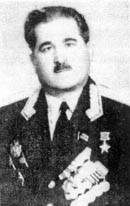
Born in Shusha Khalil Mamedov proved himself as a talented and courageous officer since the beginning of the war with fascist Germany. During 1941-1943 he fought in Ukraine, was wounded several times and each time returned to the battlefield after recovery. In 1943-1944 Mamedov commanded a tank battalion in the 3rd Ukrainian Front. He and his battalion fought heavy battles in Ukraine, when liberating the Ukrainian towns and villages, especially was distinguished in the famous «Korsun-Shevchenko» battles.
Mamedov’s name became popular throughout the front during the battles for Romania. He played a key role when liberating a heavily-defended town of Mergus. Mamedov got an order: with only 5 of his tanks to break through the enemy lines and explode a strategic bridge in the enemy rear. The operation was daring and dangerous.
The Mamedov-commanded tanks carried out the task brilliantly: broke through the German lines and exploded the bridge, thus cutting out the enemy’s way for retreat. Despite being encircled deep in the fascist rear, wounded commander Mamedov didn’t lose his head. He turned his tanks right to the enemy’s central position and seized it. Fighting in the town continued for 10 hours, but the fate of the battle was already predetermined.
In the evening, the main Soviet armed forces entered the town. In this battle Mamedov’s tank detachment annihilated 4 enemy tanks, 2 motorized cannons, 191 automobiles, 64 cannons, 105 machine-guns and 1375 fascist soldiers and officers.
For his courage and brilliant fulfillment of this operation Khalil Mamedov was awarded the title of the Hero of the Soviet Union.
Source: F. Shushinsky, «Shusha» Baku 1998



